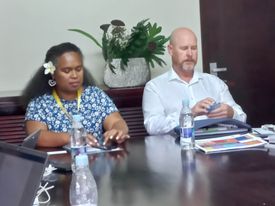By Pita Ligaiula in Port Vila
With the high rise in fuel prices across the region due to the Russian war in Ukraine, the Pacific can be a leader in carbon trading.
That’s the view of Pacific Trade & Investment Commissioner to Australia, Caleb Jarvis who told journalists in Port Vila on the side-lines of the Forum Economic Ministers Meeting (FEMM) in Vanuatu, that the region needs to create new markets.
“We can’t just forever rely on tourism and agriculture exports; we need to look at growing service exports in particular.
“But the huge opportunity I see for the Pacific at the moment is to become world leaders in carbon capture.
“And what I mean by that is that there’s …10 years ago, when we all heard about carbon capture and carbon credits and carbon trading, it was pretty new, it was pretty complicated. It came with a lot of rules and regulations.
But when we look at it today, there are now established markets for trading carbon credits,” Jarvis told journalists in Port Vila.
He said the Pacific relies on importing fuel to run its industry and provide power as well.
“Globally, there’s just a huge shift now to investing in renewable energy. And, you know, the Pacific need to be doing that as well.
“And so, I have a vision for the Pacific that could really look at doing some agroforestry type investments to use some native lands or old coconut plantations or old agricultural, pastoral farms that are no longer being utilised to reforest, to generate an income for the local communities, and to then create a whole new export sector for the Pacific.
“Because you actually can sell that carbon credit internationally and generate foreign exchange, it’s big business as well.
“And it would be, I think, remiss on all of us and national governments not to be researching this space, to work out. How do we do it in the Pacific? And, you know, that’s something that we’re going to be increasingly look at in the future,” Jarvis emphasised.
Jarvis said what they learned through their recent export surveys that traditionally, the number one barrier to businesses doing to exporters was access to capital for growth.
“Consistently, year after year after year, that’s the number one problem,” he said.
Jarvis explained in the last survey they did, access to finance dropped down to the third major barrier.
“The first two were the cost of export, which was related to high fuel and higher shipping costs.
“In some places the Pacific have led in that as you move into rural areas across the Pacific region, there are communities who have successfully been generating renewable wind energy on micro grids for forever, in terms of hydro, in terms of solar, and, you know, winds generally bit more commercial, but again, it’s not a new phenomenon.
“But the question is, well, how does the Pacific wean itself off petroleum, off diesel and off fossil fuels, and that’s going to require some good long-term planning, good policy, and then good investment as well,” Jarvis said.
SOURCE: PACNEWS











